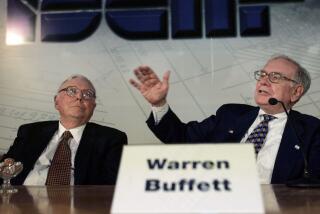Aiding the Environment Lures Big Bucks
A small company is being showcased to brokers and professional investors this week and next in which the main attractions are a new process for recycling hazardous metal waste and the fact that Warren E. Buffett has a 22% stake in it and is seeking more.
Salomon Bros. is having no trouble generating interest in its forthcoming offering of 1.5 million shares of PS Group, a company already listed on the New York Stock Exchange and selling at a relatively high price.
The story of how PS Group got to that high stock price is an instructive tale. It tells you a lot about market attitudes today, and of how environmental regulation changes perspectives on old industries. It gives you hints about building a business in these times, and it confirms the ancient wisdom that when it comes to financing, who you know is often as important as what you know.
PS Group is a San Diego company that used to own PSA Airlines. It sold the airline to USAir in 1987 and went into travel services, aircraft leasing and jet fuel distribution. When Berkshire Hathaway--the holding company run by Buffett and Los Angeles lawyer Charles Munger--bought its stake last year, PS Group had revenue of $288 million and lost $10.5 million.
Buffett didn’t invest because of travel agents or jet fuel, but because of a promising environmental technology that a PS subsidiary named Recontek has developed.
Recontek has a process for recycling hazardous metal waste that could be particularly attractive to the electronics, automotive and aerospace industries. If it works, recycling would eliminate the legal problem of trying to find safe landfills or methods of disposal.
The process is undergoing a major test right now at Recontek’s first plant in Newman, Ill., 30 miles south of Champaign. If it passes the test, Recontek has tentative Environmental Protection Agency approval to build similar plants in Indiana and Texas and site agreements for additional plants in five other states.
If the Newman plant succeeds, PS Group gets to invest at least $56 million and perhaps $200 million in more plants. One reason for the coming stock offering is to reduce PS Group debt and leave it ready to finance Recontek plants.
It’s a good time for the company to issue stock. At more than $59 a share, PS Group stock is selling at a record high, which is remarkable considering that the company lost $1.89 a share last year and 55 cents a share in the 1991 first quarter.
The market’s attitude is interesting. Investors realize that if Recontek fails the test at Newman, PS Group stock will fall. And if Recontek passes, the company will have to spend millions on new plants. But the market seems to be supporting such expenditure, seeing investment in anything that helps business cope with environmental regulation as an opportunity.
And investors obviously like the fact that Recontek has the backing of shrewd judges of business such as Buffett and Munger.
That’s fitting because Recontek came out of an entrepreneurial understanding of where the action is, not from a high-tech laboratory. Recontek, founded in 1987, grew out of a company that refined scrap metal to recover gold and silver, copper, tin and other metals.
But President John Schweikart, now 48, saw that there was less potential in recovering precious metals than in adapting the methods used to recover them to a new business. So the company founders, who include a chemist with a knowledge of federal regulations, worked to adapt 70-year-old metallurgical processes to hazardous waste.
When they thought they had succeeded, in 1989, their first instinct was to follow the time-honored route and go public. But the market wasn’t receptive to a couple of guys with an idea. So Recontek sought financing from PS Group, which had spare cash and whose boss, Chairman John P. Guerin, is a friend of Munger and Buffett. That’s how PS Group wound up owning 81% of Recontek.
The backing was fortuitous and points up a trend for the ‘90s: It’s doubtful that a nervous stock market would tolerate the start-up losses of Newman and other plants. And it shows that big private investors will be increasingly important to small business.
How good is Recontek’s process? “The least that can be said is that if it had no promise, the EPA would not have granted the company permits,” says Kay Hahn, head of Chicago Corp., and an analyst of environmental industry for 20 years.
Recontek could be a long-shot. But still, it signals a trend because its success depends on tight environmental regulation. PS Group cheerfully admits that its process would be uneconomic if the government turned around and permitted industry to go back to flushing waste down the drain or dumping it willy-nilly in any old landfill.
But few people believe that laws or governments will do that, in this country or any other. That’s one reason why Buffett and Munger are looking to increase their stake in PS Group to 45%. It’s a relatively small investment for Berkshire Hathaway, which has $8.6 billion invested in stocks and bonds. But it speaks volumes.
More to Read
Inside the business of entertainment
The Wide Shot brings you news, analysis and insights on everything from streaming wars to production — and what it all means for the future.
You may occasionally receive promotional content from the Los Angeles Times.










